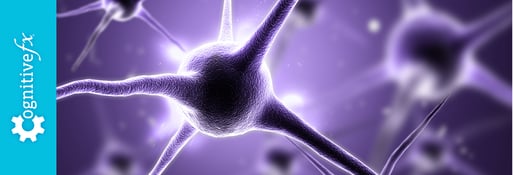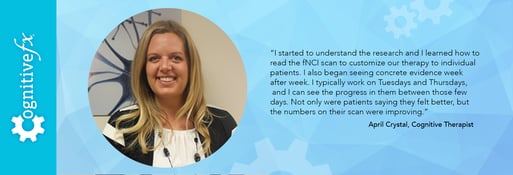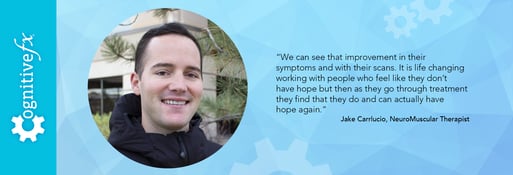5 Ways to Get Ready for Fall Sports
The new school year is just around the corner; kids are preparing for another year of learning, friendships, and experiences, and mothers are rejoicing everywhere! Whether it’s vocabulary tests,...
Published peer-reviewed research shows that Cognitive FX treatment leads to meaningful symptom reduction in post-concussion symptoms for 77% of study participants. Cognitive FX is the only PCS clinic with third-party validated treatment outcomes.
READ FULL STUDY
Using functional NeuroCognitive Imaging (fNCI) brain scan technology, we are able to measure the function and activation levels of 60 regions in the brain. We can clearly and objectively see which parts of the brain are working too hard or not working hard enough. Many of our patients are grateful for the objective analysis of fNCI because it gives them a precise understanding of how their injury is influencing their brain's ability to work efficiently.
Many patients come to us as a last resort, because everything else they have tried has not helped them in the ways they need and want. Before coming to CFX, many of our patients have followed commonly accepted protocols used after sustaining a head injury. Many have undergone a CT Scan or an MRI with the hope of finding a detailed diagnosis or answers to their symptoms and challenges.
Unfortunately, these scans only detect gross structural damage, which is almost always not found in concussion. Also, these scans cannot shed light on functional impairments and their connection to symptoms.
“Before I came to Cognitive FX I had three MRIs done. All the results came out good, and all of the doctors said I was fine. Some even suggested I was making it up, or I had depression and anxiety. When we came to Cognitive FX and I got the fNCI it was nice to see the proof and results that there was something wrong with my head and that they knew how to fix it,” said Sophie Wirth.
Many patients express how validating fNCI is, helping them understand that their cognitive dysfunction is not a character flaw, nor are they simply unintelligent or imagining things. fNCI helps both patients and their families clearly see and understand that the symptoms and challenges they are facing are real and were caused by actual experiences and injury.
“I barely have words to describe what a relief it was to have clear information that was not in the realm of what I feel but what could be measured in my brain. That by itself was worth the trip for me,” said Dan Alter.
At the end of a full week of treatment, patients undergo a second fNCI scan to see what parts of their brain have improved, and can continue to improve, with at home recommendations.
This second scan is also very validating because it gives the patient the ability to see where they got better, empowering them to take control of their brain health and their life again in new ways.
One patient explains how they use the scan to help them remember that having a hard day here and there is normal and that life will not be like it was before treatment. “I use the scan to help me objectively remember that my brain is working better. Having the second scan has helped me remember that my brain works and it is not going to stop working well unless I get injured again. That scan helps me focus on what I can keep doing to keep getting better and to stay sharp,” said Anna Empey.
By using objective measurements to diagnose the root cause of symptoms and the regions associated with those problems, we are changing the approach to rehabilitating the brain in very effective ways and in short amounts of time (one week of treatment compared to months or years).
This imaging technology changes everything we thought we knew about the brain and has helped us make new discoveries. We’ve learned so much more about the brain and its ability to change and heal, influencing the outcomes for our patients and essentially empowering our team to help change patients’ lives from around the world.

The "Cognitive FX Team" is a collaborative ensemble of distinguished doctors, therapists, and practitioners. Our experts are pioneers in the field of neuroimaging and concussion treatment. With extensive experience and a strong commitment to patient care, our team excels in utilizing cutting-edge technologies, such as functional MRI (fMRI), to provide personalized diagnostic and treatment strategies. Our renowned professionals have published groundbreaking research, developed innovative neuroimaging biomarkers, and conducted thousands of individualized patient assessments. We take pride in our holistic approach to patient care, focusing on physical, cognitive, and emotional aspects of recovery. As leaders in the industry, the Cognitive FX Team is dedicated to advancing the science of concussion diagnosis and treatment to provide our patients with the highest level of care and support.

The new school year is just around the corner; kids are preparing for another year of learning, friendships, and experiences, and mothers are rejoicing everywhere! Whether it’s vocabulary tests,...

After decades of research, Cognitive FX, in collaboration with Notus Neuropsychological Imaging, found the secret to understanding and recovering from a concussion: NeuroVascular Coupling (NVC). NVC...

It’s getting to be that time when children’s obsession with all things strange and maybe slightly scary is reaching an all-time high. They are picking out costumes, eagerly awaiting the sugar high...

April Crystal is one of our NeuroCognitive Therapists here at Cognitive FX.

Jake is a Neuromuscular Therapist here at Cognitive FX.

Lindsey is our Lead Psychometrist here at Cognitive FX.
Published peer-reviewed research shows that Cognitive FX treatment leads to meaningful symptom reduction in post-concussion symptoms for 77% of study participants. Cognitive FX is the only PCS clinic with third-party validated treatment outcomes.
READ FULL STUDY